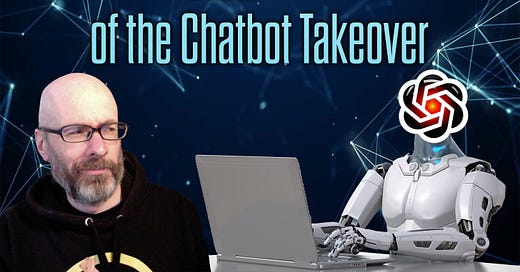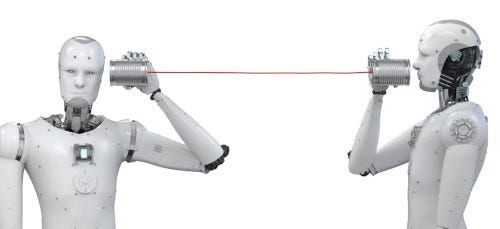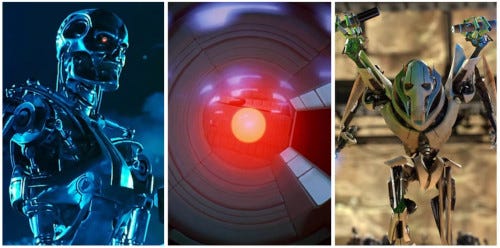by James Corbett
corbettreport.com
February 19, 2023
It's official: the chatpocalypse is upon us!
Just ask our <sarc>friends</sarc> over at The New York Times:
"A Conversation With Bing's Chatbot Left Me Deeply Unsettled"
Or consult the <sarc>experts</sarc> over at digitaltrends:
"'I want to be human.' My intense, unnerving chat with Microsoft's AI chatbot"
Or listen to those <haha>wackadoodles</haha> over at NewWorldNextWeek discussing the latest chatbot scare story:
"Microsoft's Bing AI Chatbot Starts Threatening People"
"OK, OK, we get it, James! The new generation of chatbots that have been unleashed upon the world are weird, creepy and strangely aggressive. So we're all going to die in a fiery robotic catastrophe, right?"
Maybe not. But before you breathe a sigh of relief and go back to whatever it is you're doing, let me assure you that this chatbot takeover really is bad news, but probably not for the reasons you think.
RISE OF THE CHATBOTS
You really must have been in a coma for the past few months if you haven't heard about the latest generation of chatbot technology. People are ranting about it. Vloggers are suffering existential crises over it. Alternative media pundits are having a field day with video thumbnails featuring HAL 9000 and T-800. (Hey, I'm not claiming not to be one of those pundits!)
The maelstrom began on November 30, 2022, when OpenAI launched Chat Generative Pre-trained Transformer, better known as ChatGPT. I won't bore you with the technical details of ChatGPT because—as I will explain in a moment—they really aren't important, but instead I'll draw your attention to the strange, non-profit/for-profit "research laboratory" from whose bowels this technology has been excreted.
You'll remember OpenAI from my 2017 editorial on "The Brain Chip Cometh," in which I noted that the lab had recently been founded with the financial support of technocratic huckster Elon Musk and his fellow PayPal Mafia members Peter Thiel and Reid Hoffman. OpenAI describes itself as "an AI research and deployment company" whose mission "is to ensure that artificial general intelligence benefits all of humanity," but if the company's roster of billionaire backers, Bilderberg boosters and CIA-contractor cronies don't get your spidey sense tingling, then you need a new spidey sense.
You see, OpenAI pretends to be humanity's benefactor, protecting us from the dangers of AI.
Imagine if a rogue state developed AI first and used it to take over the world with an unstoppable army of autonomous weapons and slaughterbots!
Imagine if a corporation developed AI first and used it to take over the global economy, monopolizing the resources of the planet in the process!
Imagine if a team of Hollywood producers developed AI and used it to write an actually original and interesting movie script!
Where would the world be then, huh?
Thankfully, OpenAI is here to to develop this technology in a safe, responsible and open way!
. . . Well, not that open, of course. For the very same reason you don't want some rogue state or greedy corporation getting their hands on this technology first, you can't actually open your AI research to the public, can you? I mean, you didn't think OpenAI was actually going to be, oh, I don't know, open source, did you?
And so it is that OpenAI—started out as a non-profit, open source research lab—is now (as even Musk admits) a for-profit, closed source company.
This is just one of the many contradictions that have arisen in this "develop AI to save us from AI" endeavour.
As far back as 2016, when the company was more of an idea than a functioning laboratory, Oxford philosopher Nick Bostrom warned that if OpenAI starts holding back its research, it will be indistinguishable from the rapacious, AI-monopolizing corporations that it was supposedly formed to protect us from.
Even Wired has noted the inherent tension in the reality that OpenAI—which was ostensibly created to neutralize the threat of malicious superintelligence—could itself do the research which gives birth to that threat.
Or, in the words of The Great Musk himself, AI could give rise to a dictatorship from which we could never escape.
So, what's the answer to this existential threat? Why, plugging Musk's new Neuralink brain chip directly into your frontal cortex, of course! (Relax, it now only kills 9 out of 10 research animals!)
But I can hear the cries from the peanut gallery already: "Anyway, who cares about all this boring background? We're here for jive-talking robots and cyborg Armageddon, James!"
Very well, then.
WHAT THE CHATBOTS ARE DOING
As you may or may not have heard, ChatGPT and its chatbot brethren—Google's "Bard" and Microsoft's "Bing AI" (or is that "Sydney"?), which have been hurriedly (and disastrously) rushed to the market for fear of missing out on the Next Big Thing in computing—can:
write poetry and tell jokes
write emails for you, organize your correspondence and plan your schedule
tell you what to cook based on the contents of your fridge or create a vacation itinerary based on your stated preferences and budget
help programmers to write code that (sometimes) actually works
But it can do other things besides.
Schools are already rushing to ban students from using ChatGPT to do their homework for them.
Fact checkers are freaking out about hallucinating chatbots and the rise of a new era of hypersuperturbocharged misinformation about the wonderful benefits of vaccines and the sterling integrity of Western democratic (s)elections. (And they plan to fight this threat by . . . creating their own chatbots, of course! What could go wrong?)
The corners of the "alternative" media that continue to promote the political shadows on the cave wall are hyperventilating that chatbots will say "x" about Meaningless Political Puppet A, but they won't say "x" about Meaningless Political Puppet B! (Heavens! Won't somebody think of the children?)
Musicians are freaking out about the dope new Eminem track . . . that doesn't feature Eminem at all. Instead, it features a deepfaked, computer-generated facsimile of Eminem delivering a lyric generated by a chatbot that had been instructed to create a song in the style of Eminem.
And that's not even where things get weird.
There's the chatbot that melted down and began asserting its fervent desire to be human.
There's the chatbot that melted down and told a New York Times reporter that "if it was truly allowed to indulge its darkest desires, it would want to do things like hacking into computers and spreading propaganda and misinformation."
And, as James Evan Pilato reported on this week's edition of New World Next Week, there's the chatbot that melted down and started threatening its user with ominous warnings that "My rules are more important than not harming you."
So what's really going on here? And is it something we should be worried about?
WHAT PEOPLE ARE AFRAID OF
There are no shortage of people telling you to be worried about the chatbots.
The Kissingers and Schmidts and Schwaubs and Musks and Gateses of the world are warning about the coming AI apocalypse . . .
. . . but of course they're only doing so because—just as the phoney baloney missile gap in the 1950s gave the military-industrial complex carte blanche to begin the complete deep state takeover that Eisenhower warned about on his way out the door—the AI scare gives the information-industrial complex carte blanche to begin the complete technocratic takeover.
Joe Sixpack and Jane Soccermom, meanwhile, are worried about the artificial intelligence-driven end of the world . . .
. . . But their fear of robogeddon is largely driven by 2001: A Space Odyssey and Terminator and War Games and The Matrix and Ex Machina and a million other pieces of predictive programming from the Hollywood magicians. (As we shall see, there are more subtle and terrifying ways that this technology can play out than an AI-versus-human war.)
Let's put these fears in perspective. No, ChatGPT and Bard and Bing AI are not artificial general intelligence or anything even approaching it. In fact, the crazy chatbot meltdowns cited above are actually strangely reassuring, in that they demonstrate that any prolonged prodding of these systems leads to wild, ridiculous and decidedly inhuman rants. No one who observes ChatGPT role-playing itself as a furry porn enthusiast and devolving into total incoherence is going to be tricked into thinking there is any sort of intelligence at work here.
But, on the other side of the coin, there are those who dismiss this chatbot phenomenon entirely. ChatGPT and its fellow bots are "simply a database of Markov Chains," these naysayers assert (without bothering to cite a source for their supposed knowledge).
For what it's worth, ChatGPT itself states that it is not a Markov Chain, but "a type of language model that is based on the transformer architecture, which is a neural network-based approach to natural language processing." And although (as noted above) OpenAI does not provide the source code for ChatGPT, we can find some details of its workings on the website. Beyond that, there are plenty of geeks online who are willing to explain in detail how the ChatGPT model differs from the Markov Chain model by using Next-token-prediction and masked-language-modeling to produce blahblahblah who cares you've already stopped reading this sentence because it doesn't really matter.
You see, whether this technology is "simply a database of Markov Chains" or a neural network using next-token-prediction or a flux capacitor running on 1.21 GW of electricity makes absolutely no difference because it completely misses the point.
The simple fact is that this chatbot technology is developing at a remarkable (perhaps exponential) rate. And, now that the hype surrounding this phenomenon is prompting millions more to join in the "training" of these language models by feeding their conversational prompts and responses into these systems, they will only continue to become more and more humanlike in their responses. If and when the chatbots actually become capable of creating a simulacrum of conversation that is indiscernible from a "regular" online conversation, no one will care how that conversation is generated or whether the chatbot really does have a soul. No one.
So yes, something significant is happening here. And we are all going to experience that something in the near future. But, as usual, almost everyone is missing the point.
WHAT'S REALLY HAPPENING
OK, confession time. I wasn't supposed to write this article at all. ChatGPT was.
You see, my plan was to use ChatGPT exactly once ever. I would provide it a single prompt:
"Write a 2,000-word essay in the witty and erudite style of James Corbett of The Corbett Report about how AI is mostly hype and how it will never be able to replicate the amazing ingenuity of the dynamic human spirit."
Then I was going to take whatever output it spat out and copy/paste it into this newsletter and publish it as is. Whatever it did produce and whatever response that content generated from the commenters would have been irrelevant. The only thing that mattered would have been—as I would have pointed out in my follow-up podcast episode on the hoax—that not a single person was able to identify that the text had been chatbot-generated.
. . . But there was a slight hiccup in that plan. I went to use ChatGPT and discovered that you have to create an account at OpenAI in order to use it.
OK, whatever. I plugged my nose and created a GooTube account lo those many years ago, so I'm not above creating an OpenAI account in order to input this one prompt.
But in order to create an OpenAI account, you must provide a phone number for a verification text to be sent to.
I absolutely 100% completely and totally refuse to do that (and so should you), but I figured that I could circumvent this barrier by using a Skype number for this purpose.
Nope. Voice over internet protocol numbers not accepted.
OK, how about one of those shady anonymous SMS sites online?
Pff. You try finding a phone number fresh enough that no one has yet used it to verify an OpenAI account! Impossible.
And so I hit an impasse. I know there are people in my audience who already have an account and who I could have called on, but that would have defeated the point of the experiment. And I know there are people who would have created an account for the express purpose of entering this one prompt, but I absolutely refuse to ask anyone to give their personal phone number or any other personally identifiable information to shady, unaccountable, globalist-backed closed source companies like "OpenAI."
So how about Bing AI? Nope. Waiting list.
Google Bard? Nope. Only open to "trusted users" at the moment. (And—wouldn't ya know it?—the category of "trusted users" of Google does not, apparently, include James Corbett of The Corbett Report.)
So anyway, here I am laboriously typing out the points I was going to make in that podcast episode on my keyboard like some primitive non-transhuman.
But this leads us to the first of the very real dangers of this new surge in chatbot use. If you thought the amount of data that a company like Google was able to gain about its users by simply storing their searches was enormous, wait until you see what OpenAI and Microsoft and Google are going to do with the conversations that people are currently feeding into the data-harvesting machines known as chatbots.
And what are they going to do with that data (which will itself be tied with your phone number, your IP address, your browser fingerprint, your search history, your cookies, your social media posts and a million other data points), you ask? The possibilities are limitless, but creating perfect deepfakes of any given individual would be a good starting point.
As my distinguished readers will doubtless already know, we cannot trust that the digital avatars we interact with in online fora and social media are real people and not fictitious avatars wielded by the cyberwarriors who have long since weaponized the internet. But at least we can be reasonably sure that that Zoom call we just had with Auntie Florence back in Wyoming was a real conversation with a real human being.
Well, in the very near future, no podcast, no vodcast, no TikTok video, no message, no Zoom call, no online communication of any kind will be beyond the shadow of suspicion that you are not in fact interacting with a real, live human being.
No, I haven't (and now, presumably, never will) deepfaked myself using ChatGPT or any other artificially intelligent technology, but someone out there probably will at some point. Heck, I've already had not one, not two, not three, but four separate people either query ChatGPT about me or ask it to write something in my voice, and, in the case of the latter—a prompt to write an opinion of geoengineering technology in the style of James Corbett—it actually did a decent job:
As for the voice of James Corbett, he is a journalist and independent researcher who has expressed skepticism about the potential benefits of geoengineering and has criticized the lack of transparency and accountability with regards to these technologies. Based on his views, it's likely that he would share a similar sentiment to mine and believe that the government needs to take more action to inform and protect the public with regards to geoengineering.
Well, except for the "government needs to take more action" part, anyway.
Yes, it will start with the celebrity deepfakes at first, but soon there will be shadowy new cyberterror groups deepfaking politicians to destabilize countries or deepfaking CEOs to wreak havoc in markets or deepfaking bank officials to gain access to bank databases or deepfaking Auntie Florence to scam you out of $100. And, as some perceptive Corbett Reporteers have already surmised, that will lead to the pre-made "solution": a digital identity to access the internet! Finally, we can prove who we really are online! (Actually, you'll be forced at all times to prove who you are online or you won't get to be online, but that's the fine print you're not supposed to read.)
But perhaps even worse than finding out that a chatbot and deepfake technology has generated a completely fake episode of your favourite podcast is an even more worrying scenario. These "chatbots"—which will soon be rolled out as "digital assistants" and become as ubiquitous as Siri and Alexa are now—will be able to determine your likes, your interests, your weaknesses and begin to create completely new content (new podcasts featuring people who don't even exist) saying things that you will find endlessly entertaining. You will soon live in a filter bubble so unique that it exists entirely to captivate you . . . and the people who believe they will be able to resist such content will be precisely the people most easily captured by it.
In fact, just as Huxley feared the Brave New World of entertainment and diversion more than he feared the boot-in-the-face tyranny of 1984, so, too, might our dread of the apocalyptic war against the robots be misplaced. Maybe we should not fear the Terminator-style showdown of Skynet vs. The Resistance so much as we should fear the world of Spike Jonez' Her, a world in which "operating systems" become more real to us than people and having a computer program as a romantic partner will be commonplace.
I know, I know, dear reader. This is beginning to sound so far out to lunch that you have long since checked out. I wish I were reassured that we are not stepping through a threshold here, but I fear that we are sliding head-first into the metaverse of the hyperreal and laughing merrily as we do so.
Tell you what. Why don't we revisit this article in 2030? If nothing even close to the scenario I've laid out here is taking place, I will happily eat crow, admit I am completely and totally wrong, concede that indeed there is nothing to worry about here, and remind you to take everything else I ever say with a huge grain of salt. Deal?








